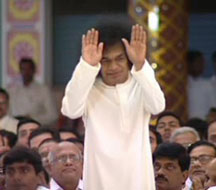
Sevadal should take up the path of Karma; With analogy
Bangalore, Brindavan (Sevadal Conference )
Description
In order to arrest the tendencies which are unfair and unjust sometimes we have to adopt that path. Suppose we come to know that thieves have entered the house at night and as soon as we come to know that, the robbers try to run away through thorny bushes. Instead of following through the thorny bushes to catch them, if we try to catch them by a car on a smooth road, we would not be able to catch them. In order to catch the thief we must pursue the path which the thief had followed. Likewise, when we want to help those who are in trouble or distress we must also be prepared to undergo the difficulties. Therefore, we must first enter the path of work and through that we must attain wisdom. In today's world when we want to put an end to the evil practices it is only through such path that we can set them right. A thorn in the foot can be removed by another thorn. If we want to remove the dirt on the cloth, it has to be washed by dirt. In earlier days we used to use some material like soil to wash our dirty clothes. In the same way we cut a diamond using a diamond. Similarly we must attain Karma through karma. So for the members of the sevadal this path of karma is most ideal and sacred one.
Topics
-Karma
-
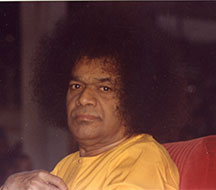
Work, worship and wisdom; Karma Marga
00:00:00“Work is worship”. Sevadals must work with the body, worship with the mind and merge in wisdom through heart. They must cultivate these three ideals, ‘work’, ‘worship’ and ‘wisdom’. Working with the body, worshipping God with the mind we must attain the state of Ananda in the heart. But without work, worship is of no importance. Work is comparable to a flower. This flower in course of time develops, the petals drop off and the tender fruit develops. So this tender unripe fruit in course of time becomes a juicy fruit. So without the flower, you cannot get the raw fruit and without the raw fruit you will not get the ripe juicy fruit. Therefore “work” is the flower, “worship” is the raw fruit and “wisdom” is the juicy fruit. From the three planes we must carry on the three avenues of activity. Social service, individual practise, universal love-- through these three avenues the Sathya Sai Organizations must be expanded. Swami gives you another example so that when you go back you can infuse enthusiasm in other sevadals. These three, work, worship and wisdom have only one goal. Several of us undertake a journey, travelling by an ordinary train. This train travels up to a station, and stops. Then we need to wait and catch another train. In this process we may experience some inconvenience and trouble. So when we travel by an ordinary train there will be loss of time and many other troubles. This ordinary train stops at all stations equally. In the ordinary train, sometimes there will be a ‘through carriage’. Changing of trains is made easy by this ‘through carriage’ as it will be attached to another train without our getting down. And the third is a ‘through train’ which runs through. Though there may be difficulties and disturbances in the path of karma , if we undertake it, it will be useful in the long run. In order to alleviate the pain and suffering of others, in order to comfort others, we have to enter the Karma marga, the path of karma.
-
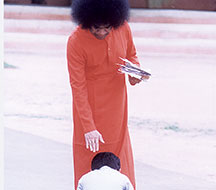
Bhagawan on Karma and Punishment
00:01:45God simply creates for all of us to experience. Government appoints Police and Military. What for? To safeguard our country they are appointed. If anyone is beaten then that punishment is given to correct your mistake. If you don't commit any mistake you will never be beaten by police. In the same way God has given certain mighty powers to humanity in this world. Your good actions will give you good results. Bad actions will take you to bad consequences and he has made it like that, this is his creation. But unfortunately, we accuse or blame the actions. It is a big mistake. In fact give up all the mistakes. Drive out all the unsacred thoughts. Let bad qualities leave. No one will punish you. In fact the one who is ready to punish you, will come and protect you. Make every effort to be free from defects and mistakes.
-
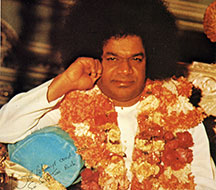
Karma, Janma, Dharma and Brahma
00:04:17The castle of Hindu philosophy has the concepts of karma, janma, dharma and brahma as its walls. For any size house, four walls are essential; then is it not imperative that the huge wide mansion of hindu philosophy requires four walls? These four attributes must coexist amicably. One cannot escape the results of one’s deeds; whether done knowingly or unknowingly one must bear the consequences thereof. Action cannot be without a consequence; actions, good or a bad, will yield result if not today, tomorrow. Hence it is this doctrine of karma which stands as the cardinal principle for every man’s life. "Man is born through his actions, Man is sustained by his actions, Man dies by his actions, Actions lead man to God, Actions are the cause for joy and sorrow in the world!" It is through karma that one is endowed with life. What is the secret behind the existence? “Sareera madhyam khalu dharma sadhanam!!”—the body has been given to undertake righteous action, hence one must uphold righteousness. One can attain the divine by following dharma. The Gita proclaims that the day dharma, the righteousness, declines, God incarnates as an avatar. All said and done what one sees in the form of body, is nothing but a manifestation of God Himself who takes the form of man to restore righteousness.
-
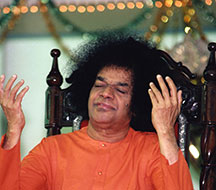
All our Karma should be Selfless
00:02:00The fact that service is superior to japa, dhyana and yoga is something you should recognize as truth. Through actions alone man can redeem his human birth.Actions only are our food, our strength, our strategy, our means to liberation. A human being is born in action, He grows in action and he decays and disappears in action. Actions are God to human beings. Out of actions come pain and pleasure in this world. We must ensure that actions, that are the source of and responsible for all the results in this life, are transformed into selfless service. Without seeking the results of our actions, having the conviction that actions are done as one's duty, that they are the proper path in this birth, we should take up appropriate actions.
-
_1439794035.jpg)
Importance of Karma or action with Analogy
00:05:32Actions are very important. Animal is born in Karma, it grows in Karma and ends in Karma. Karma is God to man, Karma is the basis for sorrow and happiness in this world. For our happiness or for our sorrow, the actions that we do are the primary cause. For the uplift of man or his downfall, actions are responsible. So, by doing good actions, by thinking good thoughts and leading a good life, to attain a good position is man's responsibility. In the Vedas, the first part is Karma. This has also been called Samhitamu. This is a synonym for Karma. The second part is called Brahmana. Brahmana describes the manner of Upasana or worship. Third part is Upanishads. Upanishads deal with wisdom, Jnana. Karma, Upasana and Jnana that is work, worship and wisdom, these three are such that they cannot be separated from each other. Without a flower there cannot be a unripe fruit in this world, without an unripe fruit, there can be no ripe fruit. Without actions, to cultivate devotion is difficult. Without devotion, we cannot become wise. Thus, these three, work, worship and wisdom are not different aspects. These three are inextricably connected with each other. It is not at all possible to separate them from each other. They are one contained in other. This is a piece of cloth. There are threads in it. In the thread, there is cotton. Just as cotton, thread and cloth are inextricably connected and included in each other, so also work, worship and wisdom are one. If there is no cotton there is no thread, if there is no thread, you cannot have cloth. Thus, though names are different, the basic material is the same. From childhood, youth, from youth old age - all are intertwined. In one single individual, is it possible to separate his childhood, his youth and his old age? It is the same entity in three separate stages. In the same manner, as we go performing actions, it takes the shape of selfless actions and transforms into worship. In this, the feeling of love emanates. As a consequence of this prema, love becomes wisdom. The paths of action, worship and wisdom are not three different things and it is essential to prove this by selfless actions.
-
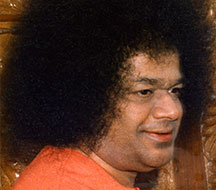
Do not expect results from your actions
00:02:31We only consider the results of the deeds that we do and the type of deeds that we do, as important. But we need to consider carefully the purpose and objective of the deeds that we do. In order to achieve success in the work they undertake, several people take to many unacceptable paths of doing the work. It is the method by which the work is done is important and not the success of the work. It is well known that man, when he wants to achieve success, will adopt wrong methods and misuse his authority. He will make people take to the wrong path. He will abuse his position and power. By inducing fear he will get success for his work. Although one may get success this way, it is really equal to failure. Success achieved by causing fear in others mind, taking away their freedom and making them subordinate to oneself by using one's strength, cannot be called a success but should be regarded as failure. If you fail at the task that you have taken up even after following your duty and not swerving from the path of truth and without losing courage, that should be regarded as success.
Topics
- Analogies
- Atma
- Attachment
- Balvikas
- Bhaja Govindam
- Bhajans
- Body
- Character
- Company
- Compassion
- Culture
- Day to day
- Desire
- Devotees
- Devotion
- Dharma
- Discipline
- Discrimination
- Doctors
- Education
- Faith
- Festivals
- Forbearance
- Gayathri
- God
- Gratitude
- Guru
- Health and healthcare
- HIS Life
- Human values
- India
- Love
- Mahabharata
- Man
- Meditation
- Mind
- Music
- Musicians
- Namasmarana
- Nature
- Parents
- Philosophical concepts
- Pleasure and Pain
- Practice
- Ramayana
- Religion
- Sacrifice
- Sadhana
- Sai Organization
- Saints
- Sathya
- Science
- Senses
- Service
- Sevadal
- Shanthi
- Shirdi Baba
- Society
- Spirituality
- Students
- Thoughts
- Time
- Unity
- Upanishad
- Vedas
- Vices
- Yoga
- Youth
